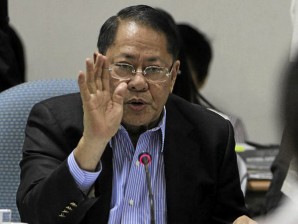Former Sen. Edgardo J. Angara may have received more than his standard entitlement under the Priority Development Assistance Fund (PDAF) but he said his pork barrel allocations never went to “fake, Napoles-type” nongovernment organizations (NGOs).
Angara, who was elected four times to the Senate, denied that his Kalusugan ng Bata, Karunungan ng Bayan Foundation was a dubious organization like the Napoles’ NGOs, saying its trustees included civic leaders from big business such as John Gokongwei, Eduardo Cojuangco Jr., Gina Lopez, Gil Puyat Jr. and Yvonne Yuchengco.
The newly retired senator said the foundation’s school feeding program benefited 17,000 to 20,000 Grade 1, Grade 2 and Grade 3 pupils in 47 public elementary schools in five provinces and five cities.
He said the program resulted in lower dropout rates and improved academic performance and physical health among the school children.
“I got my usual P200 million but I may have received, and we’re checking the veracity of this, about P300 million more because I wrote President (Gloria) Macapagal-Arroyo before to help us renovate and repair the municipal building and plaza of Baler because it was the 400th foundation day of Baler,” Angara told the Inquirer on the phone on Tuesday.
“And if I’m not mistaken, this gave me P100 million for that and I got extra for a University of the Philippines school of health branch in Baler. If I’m not mistaken, I got about P60 million or P80 million for two buildings on that campus together with the land preparation. Then there were other extra projects, which I got for Aurora,” he said.
Big difference
Angara said that the difference between his excess PDAF allocations and those of other lawmakers was, “in my case, the extra P300 million I may have received were all given or allocated directly by [the Department of Budget and Management] and released by the DBM to the [local government units] or the district engineer’s office of Aurora or to the UP.”
“That’s a big difference because I reject this insinuation that my funds went to fictitious, no-address, unaccountable NGOs. Please underscore that. My reputation has been damaged already,” said Angara, who was recently elected chair of the Global Organization of Parliamentarians against Corruption based in Canada.
“For the past 34 years I have done public service and have never been linked to any anomaly or wrongdoing and then just because of this COA report, they did not even ask us to explain what it was, and we have already a fiesta over this,” he said, referring to the media frenzy that came after the disclosure of the report.
As regards the NGO, Angara said it was formally launched in 2002 and its partner organizations included the Department of Education, the National Dairy Authority, the Food and Nutrition Institute of the Department of Science and Technology, the different LGUs where the beneficiary schools were located, the parent-teachers’ organizations and the Philippine Jaycees.
He said the foundation was duly accredited and registered by the Department of Social Welfare and Development (DSWD).
“[Before children] are given a meal, they are dewormed, they are weighed and their heights were measured. The objective was to monitor during the 120-day feeding cycle their attendance, their grades or academics and their physical health,” Angara said.
He said the group stopped its operation sometime between 2009 and 2010 when the DSWD adopted his model of school feeding. “That’s why we ceased operation,” he said.
“So how can anyone say that this is a fake Napoles type of NGO? This is a genuine civic organization only for kids. No one benefited from it except the children,” Angara said.
“I’m really appalled by your editorial calling me repugnant, that my behavior was repugnant. And then they said that the address of the office could not be located and some of the beneficiaries could not be found,” he said.
“Of course the office was already closed. How can the security guard say the office was still there? And the beneficiaries have moved on. Maybe they’re already in high school.”
